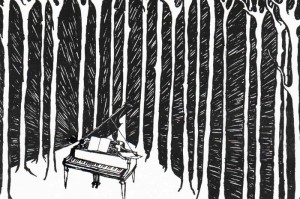Some people object to Polly Stenham’s plays because she often keeps a narrow focus on familial – if not always familiar – dynamics. I am not one of those people. Her characters – insolent, poetic, unapologetically confused – don’t give in. But you give into them.
Nevertheless her new play Hotel breaks new thematic territory. This isn’t always obvious and it’s not always smooth. Contradictory themes don’t so much blend but crash into each other with considerable force. I hesitate to expand for fear of spoilers but let’s say betrayal, accountability, consequences, violence and international aid all come into focus. Much of the play is not what it seems. Much of life is not what it seems.
With a running time of 80 minutes, the story gallops at a breathless pace. Maria Aberg’s direction keeps it on track, quite an achievement as often the play feels like a stampede. I admire Stenham’s lack of restraint and bold moral approach but she doesn’t go deep enough on any of her themes. She opens doors but lets them flapping in the wind. I would have been happy to hear any of her stories. When the adrenaline buzz settled, I could hear none.
The play was at its brilliant best in character moments: Continue reading



